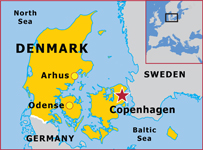 Denmark Overview
Denmark Overview
The Jutland peninsula and 400 surrounding islands that form one of the Europe’s smallest countries once spawned a seafaring race of people feared throughout northwestern Europe. Today, visitors to Denmark find a country that is peaceful, introspective, neutral and egalitarian. This is the epitome of a modern, civilized society, one especially noted for its progressive policies, widespread tolerance and a liberal social welfare system. Inland from the 4800 km (3000 miles) of white-sand beaches and unspoiled islands, you’ll find a landscape eminently suitable for cycling. Sleepy villages clustered around whitewashed churches occupy a landscape of heather moors, rolling hills and rich farmland dotted with windmills and thatched farmhouses. Ferries ply between the mainland and the islands, competing with awesome bridges like the 16km (10 miles) Øresund link to Sweden. The nation that produced the great story-teller, Hans Christian Andersen, continues to have as its hallmarks good taste, world-class design and uniformly high standards that apply equally to its cuisine, accommodation and transport. Add to this a people both amiable and helpful, with a facility for languages, and the result is an overwhelming sense of welcome. From the spirited nightlife and lively café and music scene of its capital, Copenhagen, home to world-renowned museums and cultural activities (not least the splendor of the Tivoli Gardens), to a countryside that abounds in Renaissance churches, medieval castles and 18th-century fishing villages, Denmark is a synergy of harmonious relationships.
General Information
Area: 43,093 sq km (16,638 sq miles)
Population: 5,432,335
Capital: Copenhagen
Geography: Denmark is the smallest Scandinavian country consisting of the Jutland peninsula, north of Germany, and over 400 islands of various sizes, some inhabited and linked to the mainland by ferry or bridge. The landscape consists mainly of low-lying, fertile countryside broken by beech woods, small lakes and fjords. Greenland and the Faroe Islands are also under the sovereignty of the Kingdom of Denmark although both have home rule. The Faroe Islands are a group of 18 islands in the North Atlantic inhabited by a population of 47,449 whose history dates back to the Vikings.
Language: Official language Danish. Many Danes also speak English, German and French.
Money
Currency: Danish Krone (DKr)
Credit Cards: American Express, Diners Club, MasterCard and Visa are widely accepted, as well as Eurocheque cards.
Banking Hours: Mon-Wed and Fri 9:30am-5pm; Thurs 9:30am-6pm. Some banks in Copenhagen are open Mon-Fri 9:30am-5pm. Some bureaux de change are open until midnight
International Travel
Air: The national airlines are SAS (SK) (www.flyas.com) and Sterling Airlines (SA (formerly Maersk Air) (www.sterlingticket.com). The major carriers are British Airways and SAS.
Approximate flight times:
London to Copenhagen is 1 hour 50 minutes
New York to Copenhagen is 7 hours 40 minutes
Los Angeles to Copenhagen is 11 hours 15 minutes
Singapore to Copenhagen is 15 hours 5 minutes
Sydneyto Copenhagen is 22 hours 50 minutes
International Airports
Copenhagen (CPH) (Kastrup) (www.cph.dk) is 8km (5 miles) southeast of the city (travel time 15-30 minutes). A rail link connects the airport and main railway station in Copenhagen (travel time – 12 minutes. There are also regular bus services from the airport departing every 10-20 minutes (travel time – 20 minutes).
Social & Business Customs
Food
Most Danes have Smörrebröd for their lunch. This is a slice of dark bread with butter and topped with slices of meat, fish or cheese and generously garnished. It bears no resemblance to traditional sandwiches and needs to be eaten sitting down with a knife and form. Shellfish also form an important part of Danish cuisine. Apart from traditional dishes, French or International cuisine is the order of the day. In Copenhagen, superb gourmet restaurants can be found whilst Ǻlborg is noted for its impressive number of restaurants.
Drink
Danish coffee is delicious and if you like it very strong, ask for mocha. Denmark also has many varieties of beers, famous breweries being Carlsberg and Tuborg. The other national drink is akvavit, popularly known as snaps, which is neither an aperitif, cocktail nor liqueur and is meant to be drunk with food preferably with a beer chaser. It is served ice cold and only accompanies cold food. There is no licensing hours.
Shopping
Copenhagen has excellent shopping facilities. Special purchases include Bing & Gründal and Royal Copenhagen porcelain, Holmegård glass, Georg Jensen silver, furs from AC Bang and Birger Christensen, Bornholm ceramics, handmade woolens from the Faroe Islands and Lego toys. Visitors from outside the EU can often claim back on some of the MOMS (VAT) on goods that are sent back to their home country from the shop in Denmark.
Shopping Hours
Mon-Fri 9/10am-5:30/6pm; Sat 9am-5pm. Supermarkets are often open Mon-Fri 9am-8pm. Opening hours vary from town to town since shops can regulate their own hours. At some holiday resorts, shops are open Sunday and public holidays.
Social
Normal courtesies should be observed. Guests should refrain from drinking until the host toasts to his or her health. Casual dress is suitable for most places but formal wear is required at more exclusive dining rooms and social functions. Smoking is restricted on public transport and in some public buildings.
Tipping
Hotels and restaurants quote fully inclusive prices and tipping is not necessary. Taxi fares include tip.
Business
English is widely used for all aspects of business. Local business people expect visitors to be punctual and the approach to business is often straightforward. Avoid business visits from mid-June to mid-August, which are prime holiday periods. Office hours: 9am-4/5:30pm Monday to Friday.
Climate
Summer extends from June to August. Winter is from December to March, west with long periods of frost. February is the coldest month. Spring and autumn are generally mild.